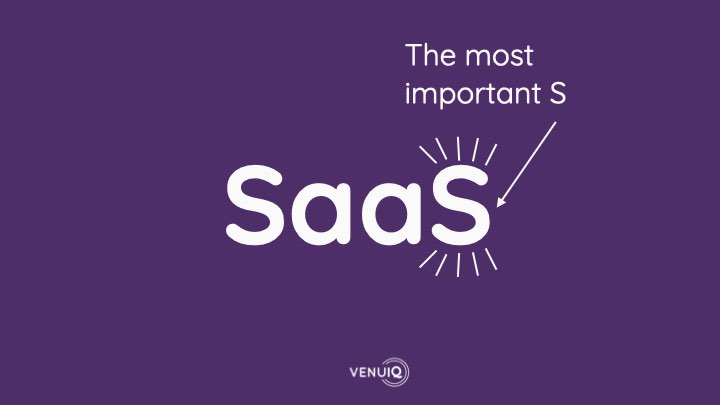The VenuIQ team recently exhibited at Event Tech Live 2022. Held in the vast halls of Excel in London from November 15-16, we had an excellent time (but really should have taken more of us along as it was incredibly busy!) Amongst our duties talking to event organisers from around the UK, we found a bit of time to present on a topic dear to our heart, service, in our talk ‘The most important s in SasS’. Below is Luke’s full talk, along with the key takeaways from our presentation.
The most important ‘s’ in Software as a Service (it isn’t Software)
If you’re looking for an event technology partner, then we have a few tips for you. Service is by far the most important part of your event experience, and here’s how to select a suitable event tech partner.
Start with the Event Brief
Scope Effectively
Start at the beginning by scoping your event brief effectively. This will come down to two opposing issues, functions vs goals or budget vs importance.
Don’t run before you can walk
If this is your first event or your first time adding technology, then limit the amount of technology you’d like to use. Start small and then build on top of it once you’re comfortable.
Identify event goals, not functionality
Set out event goals first rather than choosing what event technology you want. Examples:
- increase networking vs matchmaker or messaging
- improve sponsor ROI vs lead scanning
- increase session engagement vs live Q&A.
Let the supplier be the expert
- Make your supplier recommend how to achieve goals with their functionalities. Otherwise, each supplier will demonstrate exactly the same.
- They should use a proven case study. Preferably one from your industry.
- Let your objectives fit their functionality vs shoehorning your functionality into their product or development
Have a long-term plan
You don’t need it all in year one
- Identify year one goals vs long-term
- Have a targeted ‘what’s in it for me’ pitch for year one. Build on that.
- Learn from reporting!
- Wound Care exhibition example
- Q&A, polling & sessions added to agenda – year one
- Live networking & scanning booths – year two
- Full QR code for entrance & lead scanning – year three
Hindsight is a wonderful thing
- Test your hypothesis year one and plan from there!
- Your audience is likely to use 3 x features!
- Don’t guess your audience’s reaction. Prove it with reporting and feedback surveys.
- Bespoke developments have a huge chance of succeeding when based on data, not assumptions.
- “If we have data, let’s look at data. If all we have are opinions, let’s go with mine.”
How can it scale?
- What scope is there for future developments?
- This could be perfect for year one, but what about after that?!
- Have they got examples of an engagement or functionality growth with previous industry clients?
Budget is key
Budget on the value that event technology brings to:
- You
- Suppliers
- Attendees
- Speakers and learning
- Unseen time savings
This does mean you could be overspending too
- £10k for an agenda and networking list
Make sure your budget plan is more than one year
- Year one budget may be higher, but averages out over three years.
- Example of branding design – year one big spend on image, ethos and values vs year two & three of maintenance and updating.
How to select your event tech partner
Tip 1: Quality vs Quantity
- Speak to your peers
- xx% of our new customers come from recommendations”
- Spending an hour with 5 will tell you way more than 20 minutes with 15
- That doesn’t mean book 5 right away
- Sit 3 and book 2 additional when you know you what you want
Tip 2: Don’t ever buy from a slide deck
- Speak to your peers
- Spending an hour with five will tell you way more than 20 minutes with 15
- That doesn’t mean book five right away
- Sit three and book two additional when you know you what you want
- Why? It’s the reality of what has been delivered, not what hypothetical promises.
Tip 3: Use all your knowledge
- Nobody knows your event(s) as you do.
- Ask salespeople, marketers and operations to join
- Effective event tech will be relevant for all departments when used well
- Makes sure you don’t buy something one of your teams will hate.
- It’s just as much for you as it is for your event stakeholders & attendees.
Tip 4: Gauge the service & software
- You will be buying into the people more than the software
- Are you and your team tech-savvy?
- Don’t live in denial
- Cost doesn’t guarantee you service
- We (event tech suppliers) mostly do the same thing. Its about listening, scoping and delivering.
Tip 5: Find out the true cost
- Event tech pricing is a nightmare.
- Look for open-book pricing, full transparency – like our website.
- Find out what is included on the demo
- Will their pricing be relevant to you
- Stay away from variable usage costs.
- Agree on a fixed rate
- Watch out for minimum spend agreements for multi-year agreements
What should happen now you’ve bought it?
Timeline
Have a strong timeline in place with milestones for:
- Training (will it be knowledge banks?)
- Do you need a 7-day certification to use it?
- Collateral provided
- Who’s making it?
- Launch dates
- Internal vs external
Who can you speak to?
Should have a project manager and account manager with knowledge of:
Planned functionality, Type of attendee, Event goals
You should have periodic catch-ups planned
Can they REALLY deliver?
What happens when the S**T hits the fan?
All software is great until:
- last minute branding change
- Needing app earlier
- Adapting to new report requirements
Who’s responsible or responsive?
- Will you receive onsite or priority support?
- Find out what their response times are.
- Speak to your network.
Will your tech partner support you with changes?
Wanting to use live Q&A? Are your existing chairs be up to the task?
Need to use lead scanning? Can your badge printer do this for you?
Want live session reporting? Does your agenda complement or negatively impact your ambitions for reporting?
Can you prove ROI?
Scope your reports pre-purchase
Best practice reports would be:
- Uptake/engagement report.
- Conversations started vs connections made.
- How many meetings have been booked?
- Leads for sponsors – easily benchmarked vs competitor sponsors.
- Session attendance.
Reports should be Live & Accessible
- Don’t wait until post-event to action your data.
- Get information while it’s useable.
- Actionable information that could be used onsite.
- Fix the problem now vs apologizing post-event.
- Deliver measurable improvements to your event and sponsors hour-by-hour or day-by-day.
There are more solutions than just an app:
- QR Code tracking
- Bluetooth tracking
- Data, data, and more data to make accurate decisions in real-time and the future.
Post-Event plans
Make sure you debrief & re-scope
- The supplier should review reports & onsite (if attended) to provide future improvements.
- Tweak the short-term and long-term plans.
- Do you need to develop or change suppliers?
- What worked best, and how can we capitalise?
Summary
- Scope on goals, not functionality
- Let the supplier scope out functions.
- The budget should be based on the importance of tech
- Demos are Quality over quantity
- If it’s not a live demo, don’t buy it
- Use your industry peers
- Get the real price
- What are their service guarantees?
- Can they prove the required ROI to you & stakeholders?

